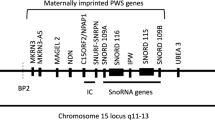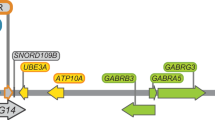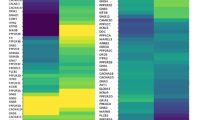Abstract
The SNORD116 locus lies in the 15q11-13 region of paternally expressed genes implicated in Prader–Willi Syndrome (PWS), a complex disease accompanied by obesity and severe neurobehavioural disturbances. Cases of PWS patients with a deletion encompassing the SNORD116 gene cluster, but preserving the expression of flanking genes, have been described. We report a 23-year-old woman who presented clinical criteria of PWS, including the behavioural and nutritional features, obesity, developmental delay and endocrine dysfunctions with hyperghrelinemia. We found a paternally transmitted highly restricted deletion of the SNORD116 gene cluster, the shortest described to date (118 kb). This deletion was also present in the father. This finding in a human case strongly supports the current hypothesis that lack of the paternal SNORD116 gene cluster has a determinant role in the pathogenesis of PWS. Moreover, targeted analysis of the SNORD116 gene cluster, complementary to SNRPN methylation analysis, should be carried out in subjects with a phenotype suggestive of PWS.
Similar content being viewed by others
Log in or create a free account to read this content
Gain free access to this article, as well as selected content from this journal and more on nature.com
or
References
Goldstone AP, Holland AJ, Hauffa BP, Hokken-Koelega AC, Tauber M : Recommendations for the diagnosis and management of Prader-Willi syndrome. J Clin Endocrinol Metab 2008; 93: 4183–4197.
Cassidy S, Schwartz S, Miller JL, Driscoll DJ : Prader-Willi syndrome. Genet Med 2012; 14: 10–26.
Schüle B, Albalwi M, Northrop E et al: Molecular breakpoint cloning and gene expression studies of a novel translocation t(4;15)(q27;q11.2) associated with Prader-Willi syndrome. BMC Med Genet 2005; 6: 18.
Skryabin BV, Gubar LV, Seeger B et al: Deletion of the MBII-85 snoRNA gene cluster in mice results in postnatal growth retardation. PLoS Genet 2007; 3: e235.
Ding F, Li HH, Zhang S et al: SnoRNA Snord116 (Pwcr1/MBII-85) deletion causes growth deficiency and hyperphagia in mice. PLoS One 2008; 3: e1709.
Duker AL, Ballif BC, Bawle EV et al: Paternally inherited microdeletion at 15q11.2 confirms a significant role for the SNORD116 C/D box snoRNA cluster in Prader-Willi syndrome. Eur J Hum Genet 2010; 18: 1196–1201.
Sahoo T, del Gaudio D, German JR et al: Prader-Willi phenotype caused by paternal deficiency for the HBII-85 C/D box small nucleolar RNA cluster. Nat Genet 2008; 40: 719–721.
de Smith AJ, Purmann C, Walters RG et al: A deletion of the HBII-85 class of small nucleolar RNAs (snoRNAs) is associated with hyperphagia, obesity and hypogonadism. Hum Mol Genet 2009; 18: 3257–3265.
Kim SJ, Miller JL, Kuipers PJ et al: Unique and atypical deletions in Prader-Willi syndrome reveal distinct phenotypes. Eur J Hum Genet 2012; 20: 283–290.
Feigerlova E, Diene G, Conte-Auriol F et al: Hyperghrelinemia precedes obesity in Prader-Willi syndrome. J Clin Endocrinol Metab 2008; 93: 2800–2805.
Diene G, Mimoun E, Feigerlova E et al: Endocrine disorders in children with Prader-Willi syndrome data from 142 children of the French database. Horm Res Paediatr 2010; 74: 121–128.
Bachré N, Diene G, Delagne V et al: Early diagnosis and multidisciplinary care reduce the hospitalization time and duration of tube feedins and prevent early obesity in PWS infants. Horm Res Paediatr 2008; 69: 45–52.
Anderlid BM, Lundin J, Malmgren H, Lehtihet M, Nordgren A : Small mosaic deletion encompassing the snoRNAs and SNURF-SNRPN results in an atypical Prader-Willi syndrome phenotype. Am J Med Genet Part A 2013; 9999: 1–7.
Cavaille J, Buiting K, Kiefmann M et al: Identification of brain-specific and imprinted small nucleolar RNA genes exhibiting an unusual genomic organization. Proc Natl Acad Sci USA 2000; 97: 14311–14316.
Zhang Q, Bouma GJ, McClellan K, Tobet S : Hypothalamic expression of SnoRNA Snord116 is consistent with a link to the hyperphagia and obesity symptoms of Prader-Willi syndrome. Int J Dev Neurosci 2012; 30: 479–485.
Yin QF, Yang L, Zhang Y et al: Long noncoding RNAs with snoRNA ends. Mol Cell 2012; 48: 219–230.
Vitali P, Royo H, Marty V, Bortolin-Cavaillé ML, Cavaillé J : Long nuclear-retained non-coding RNAs and allele-specific higher-order chromatin organization at imprinted snoRNA gene arrays. J Cell Sci 2010; 123: 70–83.
Powell WT, Coulson RL, Crary FK et al: A Prader-Willi locus lncRNA cloud modulates diurnal genes and energy expenditure. Hum Mol Genet 2013; 22: 4318–4328.
Powell WT, Coulson RL, Gonzales ML et al: R-loop formation at Snord116 mediates topotecan inhibition of Ube3a-antisense and allele-specific chromatin decondensation. Proc Natl Acad Sci USA 2013; 34: 13938–13948.
Schaaf CP, Gonzalez-Garay ML, Xia F et al: Truncating mutations of MAGEL2 cause Prader-Willi phenotypes and autism. Nat Genet 2013; 45: 1405–1408.
Acknowledgements
We thank the patient and her family. SE was the recipient of a grant from Pfizer (grant 08766A10). This work was part of the National Programme for Clinical Research from the French government (PHRC) (grant 0811601) and the Clinical Research Programme of Midi Pyrénées (grant 09004797). We thank Sandoz France and Ipsen France for financial support.
Author information
Authors and Affiliations
Corresponding author
Ethics declarations
Competing interests
The authors declare no conflict of interest.
Additional information
Supplementary Information accompanies this paper on European Journal of Human Genetics website
Supplementary information
Rights and permissions
About this article
Cite this article
Bieth, E., Eddiry, S., Gaston, V. et al. Highly restricted deletion of the SNORD116 region is implicated in Prader–Willi Syndrome. Eur J Hum Genet 23, 252–255 (2015). https://doi.org/10.1038/ejhg.2014.103
Received:
Revised:
Accepted:
Published:
Issue date:
DOI: https://doi.org/10.1038/ejhg.2014.103
This article is cited by
-
Effects of early recombinant human growth hormone treatment in young Chinese children with Prader–Willi syndrome
Orphanet Journal of Rare Diseases (2023)
-
The importance of pseudouridylation: human disorders related to the fifth nucleoside
Biologia Futura (2023)
-
Sleep Consequences of Prader-Willi Syndrome
Current Neurology and Neuroscience Reports (2023)
-
Hypothalamic syndrome
Nature Reviews Disease Primers (2022)
-
Oxytocin-based therapies for treatment of Prader-Willi and Schaaf-Yang syndromes: evidence, disappointments, and future research strategies
Translational Psychiatry (2022)



